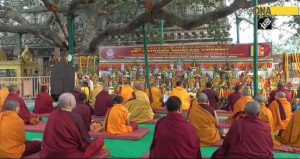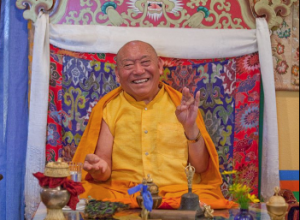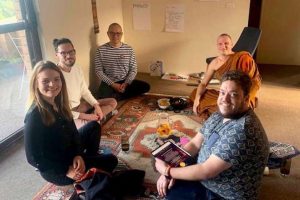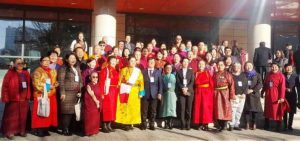
Khyentse Foundation, a nonprofit organization founded by the renowned Bhutanese lama, filmmaker, and author Dzongsar Jamyang Khyentse Rinpoche, has announced that a major collection of 2,000-year-old Buddhist manuscripts in the Gandhari language and Kharoshthi script have been donated to the Islamabad Museum in Pakistan.
The estimated 50–60 birch-bark scrolls and scroll fragments of Buddhist texts represent the largest collection of Gandhari birch scrolls known to date, and, based on a preliminary paleographical analysis and radiocarbon dating of select manuscripts, are are believed to date from the first century BCE to the second century CE.
“The collection preserves a great variety of text types that bear witness to the rich Buddhist literary culture of Gandhara, an area corresponding to present-day northern Pakistan and eastern Afghanistan. Examples of texts from the earliest period of Buddhist literature are a Gandhari version of what in Pali is known as the “Chapter of Eights” (Atthakavagga), which forms a part of the canonical Suttanipata, and a section of the monks’ disciplinary (pratimoksa) rules,” Khyentse Foundation said in an announcement shared with BDG. “Indeed, these and similar manuscript finds have been referred to as the Dead Sea Scrolls of Buddhism.”

Khyentse Foundation was founded by Dzongsar Khyentse Rinpoche in 2001 with the aim of promoting the Buddha’s teaching and supporting all traditions of Buddhist study and practice. The foundation’s activities include major text preservation and translation projects, support for monastic colleges in Asia, a worldwide scholarship and awards program, development of Buddhist studies at major universities, training and development for Buddhist teachers, and developing new modes of Dharma-inspired education for children.
“The Islamabad Museum Gandhari manuscript collection is, in fact, one of several such collections to have surfaced since the early 1990s. These other manuscript collections, all of which must originate from Pakistan or Afghanistan, have found their way onto the antiquities market, with some being donated to major public institutions such as the British Library and others ending up in private collections in Europe, Japan, Pakistan, and the US,” Khyentse Foundation observed.
With the support of Khyentse Foundation, the donation was made to the Islamabad Museum under an agreement between Pakistan’s Department of Archaeology and Museums (DOAM) and the University of Sydney, with the assistance of the Australian High Commission in Islamabad and the Pakistan High Commission in Canberra. The agreement was formalized at the Islamabad Museum on 20 December last year by DOAM director general Dr. Abdul Azeem in the presence of the secretary of Pakistan’s National Heritage and Culture Division Fareena Mazhar.

“The Islamabad Museum collection is unique in that it has found a permanent home in a major public institution in Pakistan. This agreement sets a precedent for the reversal of the common scenario whereby such materials are taken out of the region as part of the antiquities trade, resulting in a great loss of cultural heritage to Pakistan and Afghanistan,” Khyentse Foundation explained. “The housing of these Gandhari manuscripts at the Islamabad Museum and their conservation there will form the basis for collaboration with Pakistani scholars and for training Pakistani students in order to promote the conservation and study of such materials and the documentation of Pakistan’s rich Buddhist heritage.”
Under the agreement, the collection of manuscripts will be conserved, analyzed, digitized, and published by the Gandhari Manuscript Project (GMP), an international team of scholars headed by Prof. Mark Allon of the University of Sydney. The team is composed of experts in the Buddhist literature, languages, history, art, archaeology, and epigraphy of ancient Gandhara, as well as in digital humanities and museum governance and curatorship.*
“These new manuscripts are of inestimable value to the study of the development of Buddhist thought in South Asia, the transmission of Buddhism to China, and the history of Buddhism in ancient Gandhara (an area corresponding to present-day northern Pakistan and eastern Afghanistan), in South Asia more generally, and in Central Asia and China,” the University of Sydney noted. “They are also central to our study of Buddhist languages and literature, provide examples of previously unknown texts and very early copies of texts known in other languages, such as Pali, Sanskrit, and Chinese.” (The University of Sydney)

Khyentse Foundation’s achievements over the last 20 years include: more than 15 million pages of Buddhist texts preserved and made available online; education provided for the children of more than 1,000 families; support for Buddhist studies at more than 35 major universities through endowed chairs and professorships, graduate support, and the establishment of Buddhist studies centers; more than US$1 million in sponsorship for Buddhist teacher-training granted; sacred Buddhist texts translated into more than 15 languages, thanks to the efforts of 84000: Translating the Words of the Buddha, the Kumarajiva Project, and the Khyentse Vision Project; over US$1.8 million in funding granted to uphold Buddhism in its mother countries, including grassroots partnerships to revitalize interest in Buddhism in India; more than 2,000 scholarships and awards in recognition of excellence in Buddhist study and practice; support for over 3,000 monks and nuns to maintain the tradition of Buddhist scholarship in a monastic setting; and more than 120 open-access Ashoka and Trisong grants distributed to support Dharma and well-being programs.
* University of Sydney in Australia Seeks Crowdfunding for Gandhari Buddhist Texts (BDG), Scholars Inch Closer to Understanding and Sharing Ancient Buddhist Manuscripts (BDG), and Ethics Complaint about Gandharan Manuscripts Leads to Admonishment of Australian Academic (BDG)
See more
Khyentse Foundation
2,000–year–old Gandhari Buddhist Manuscripts Find Permanent Home in Pakistan (Khyentse Foundation)
Gandhari Manuscript Project (The University of Sydney)
Related news reports from BDG
Khyentse Foundation Accepting Nominations for 2023 KF Award for Dissertation in Buddhist Studies
Khyentse Foundation Presents 2022 KF Award for Outstanding PhD Dissertation in Buddhist Studies
Khyentse Foundation Marks 20 Years in the Service of the Buddhadharma
Windows into Buddhism: Khyentse Foundation Announces Launch of New Book and Website
Buddha Path Hostel: Khyentse Foundation Announces a New Short Film on the Buddhist Teaching
Khyentse Foundation’s Kumarajiva Project Shifts Focus to Training Translators
Khyentse Foundation’s Kumarajiva Project Marks 2nd Year with 7 Buddhist Texts Translated into Chinese
Khyentse Foundation Announces New Green Tara Sadhana eBook
Khyentse Foundation Launches Goodman Lecture Series
Khyentse Foundation Funds Tibetan Buddhist Studies Chair in Munich
Khyentse Foundation Launches New Initiative to Translate the Works of Jamyang Khyentse Wangpo
Khyentse Foundation Announces Online Publication of the Sutra of the Questions of Brahma in Chinese












